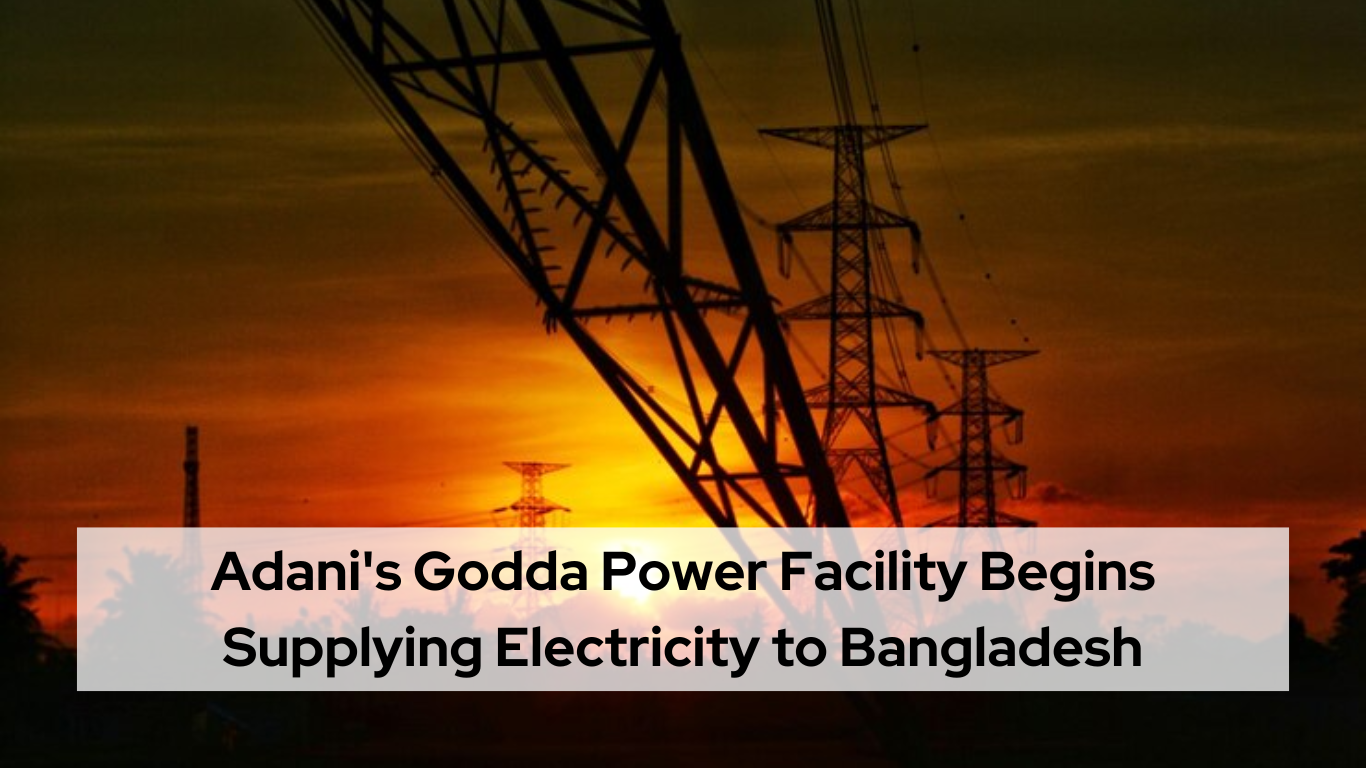Adani’s Godda Power Facility Begins Supplying Electricity to Bangladesh

Godda, in India’s Jharkhand province, is home to Adani Power Ltd.’s first 800 MW ultra-super-critical thermal power generating complex, and the company has begun selling 748 MW of electricity to Bangladesh.
Power from Adani Godda will replace costly power from liquid fuel, reducing the average cost of power bought, according to a business statement, which will greatly help the situation in the neighbouring nation. The Godda power plant is an important part of the strong partnership between India and Bangladesh, according to S.B. Khyalia, CEO of Adani Power.
Because of this, Bangladesh’s industries and ecosystem will be able to compete more effectively in the global market. It will rank among the world’s most advanced thermal power plants and will be the eco-friendliest thermal power plant ever built in India and the whole Southeast region. On Day One, operations began at the country’s first power plant, which boasts 100% Flue Gas Desulphurisation (FGD), SCR, and Zero Water Discharge.
Partnership between APJL and BPDB for Power Procurement
Adani Power Jharkhand Limited (APJL), a wholly-owned subsidiary of APL, and the Bangladesh Power Development Board (BPDB) entered into a long-term Power Purchase Agreement (PPA) in November 2017 to acquire 1,496 MW net capacity electricity from Godda’s 2X800 MW ultra-supercritical power plant.
The second 800 MW unit of India’s biggest private power generator is anticipated to be commissioned shortly. Delays occurred in the project due to the pandemic and the transmission infrastructure in Bangladesh not being finished.
One of the biggest power-generating facilities in the Indian subcontinent area that uses liquid fuels is located in Bangladesh, according to the company’s statement. More than 7,600 MW is the combined installed capacity of plants that use heavy fuel oil (HFO) and plants that use high-speed diesel (HSD), with the former accounting for about 6,329 MW and the latter for roughly 1,290 MW.
Compared to Adani Godda Power Plant’s tariff—which is estimated to be around 9 cents/KWh—the total tariff of HFO-based plants is around BDT 22.10/kWh (USC 21/KWh) and the total tariff of HSD-based power plants is around BDT 154.11/kWh (USC 149/KWh), according to BPDB’s annual report for the fiscal year 2021-22. The entire pricing of Godda TPP is competitive compared to peers, according to the Adani Power statement, even though Bangladesh currently has long-term PPA contracts with three other imported coal-based producers.
First Unit of Adani Power (Jharkhand) Limited’s Ultra-Supercritical Power Plant in Godda Commences Commercial Operations
Unit 1 of the 2×800 MW ultra-supercritical power plant of Adani Power (Jharkhand) Limited (APJL), located in the Godda region of Jharkhand, has reached commercial operations, the firm said in an exchange filing. The project has a capacity of 800 MW. The Bangladesh Electricity Development Board will receive electricity from APJL, a subsidiary of Adani Power Limited, for a net capacity of 748 MW from Unit 1 over 25 years.
“Based on the information provided, APJL has initiated the processing of its claims under the PPA,” the company said.
In spite of facing numerous obstacles, including unprecedented waves of COVID-19, Adani Power Jharkhand Limited was able to synchronise its first unit with the power grid of Bangladesh. This was accomplished in the presence of representatives from the Bangladeshi government and was accomplished through a dedicated transmission line that ran from Adani Godda to Bangladesh.
The necessary transmission evacuation mechanism was subsequently activated on the Bangladeshi side in March 2023. According to the report, the Reliability Run Test, which included Commercial Operation Tests, was completed with the participation of officials from the Power Grid Corporation of Bangladesh (PGCB) and competent authority from BPDB.
Advanced Features and Environmental Compliance of the Godda Power Plant
Two units of state-of-the-art “Ultra Super Critical Technology” that use cutting-edge methods for managing coal and water consumption and emissions make up the Godda Power Plant.
The facility has been equipped with Flue Gas Desulphurisation (FGD) and Selective Catalytic Reduction (SCR) to reduce emissions and comply with the most recent environmental standards set by the Ministry of Environment, Forest, and Climate Change (MoEF). Operating in accordance with the most recent environmental pollution standards, this facility will be unique in both Bangladesh and India.
In addition to a 40 MW solar power plant in Gujarat, Adani Power’s seven power plants in the states of Gujarat, Maharashtra, Karnataka, Rajasthan, Chhattisgarh, and Madhya Pradesh generate 13,610 MW of installed thermal power.
Conclusion
The region’s energy landscape has reached a major milestone with the inauguration of electricity transmission to Bangladesh from the Adani Godda power project. This collaboration not only meets Bangladesh’s energy demands but also establishes a standard for sustainable power production in the Indian subcontinent via the use of cutting-edge technology and a dedication to environmental compliance. As the project moves forward, it will undoubtedly enhance bilateral relations and encourage further cooperation between the two countries regarding energy infrastructure.

